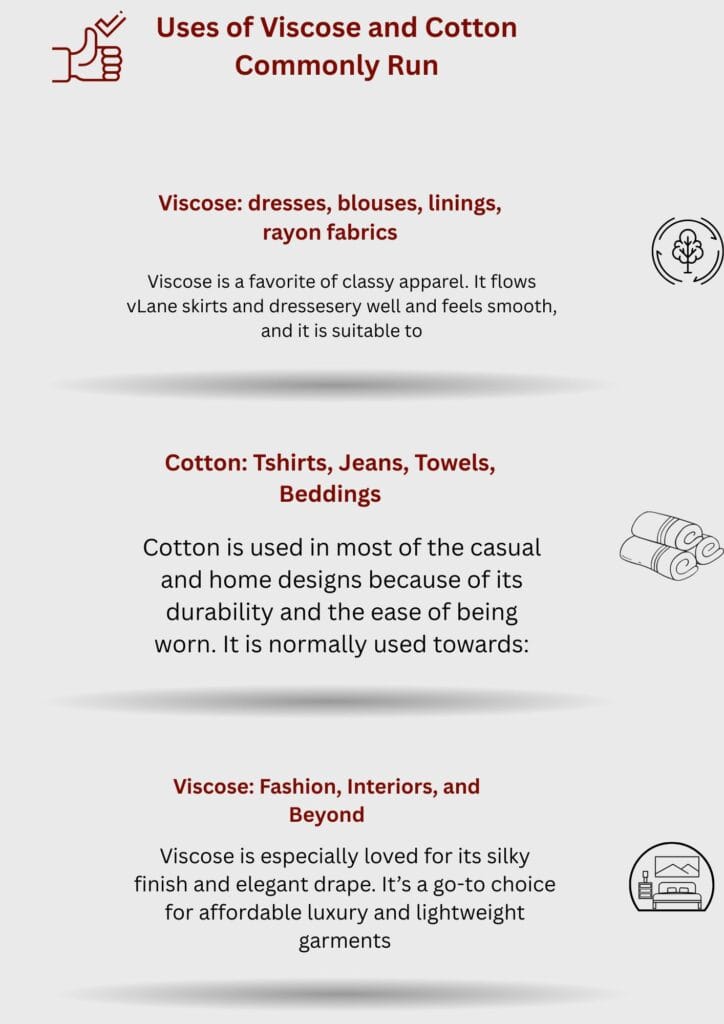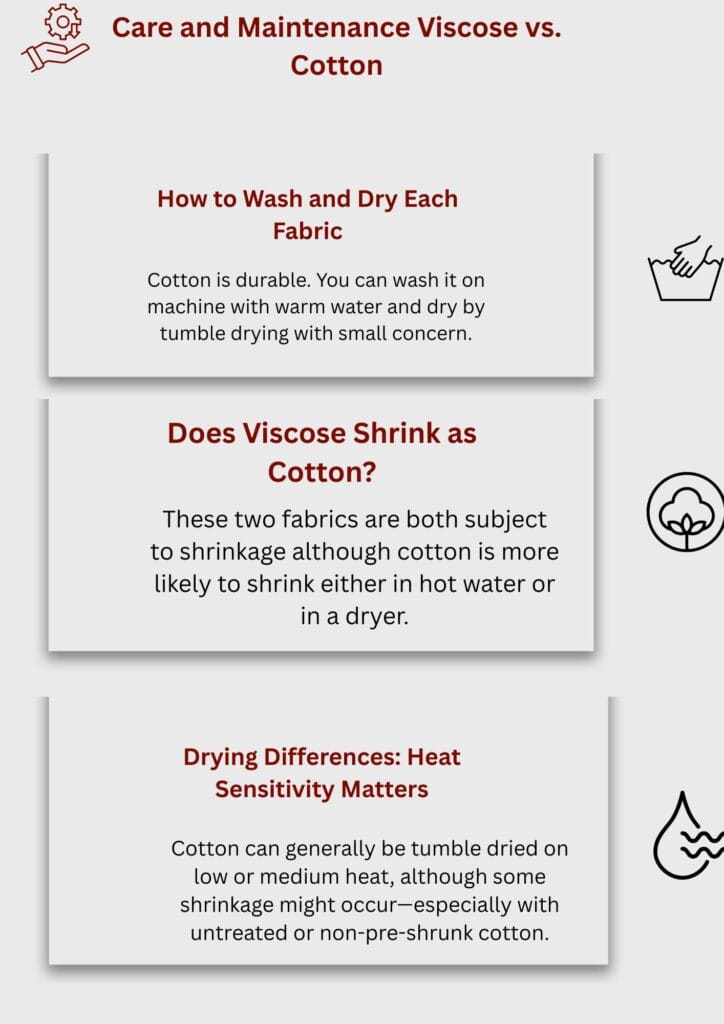introduction
When you visit a shoe store and see those fabrics which are viscose or cotton what do you think? However the question is, is it viscose cotton? Despite the fact they seem to be similarly painless when touched, the answer is not so simple as you would think.
Rayon It is a semi synthetic fiber, which is manufactured using natural materials, such as wood pulp. It is produced after chemically processing, but remains to be soft and breathable. Cotton, however is a natural fiber as it is plucked off the cotton plant. It is one of the oldest and well-popular materials all over the world.
The similarity between the two fabrics on texture and breathability tends to leave individuals in this dilemma when coming up with a distinction between them. They however differ in origin, processing, durability and sustainability. The article is meant to cover everything you ought to know about these fabrics in order to make informed choices towards the lifestyle that you have.
Is it Viscose Cotton? The Key Difference
As a clarification, viscose is not cotton. Although they might be similar in their feelings, they have contrasting backgrounds. Cotton is purely natural whereas viscose is a semi-synthetic material which synthesis is carried out through human activity.
Viscose begins as a pulp of woods and in most cases is of fast-growing trees such as eucalyptus or beech. The pulp is treated chemically and is spun to make soft thread-like fibers. Due to this fact viscose cannot be considered to be a naturally occurring fabric. One should rather speak of a regenerated cellulose fiber.
Cotton on the other hand is derived out of the fluffy seed fiber of the cotton plant. It does not require chemical treatment to wear it in fabric form. The difference is important since it affects how the two fabrics will feel when using it in everyday life.
Viscose vs. Cotton: Key Comparisons
It is time to get into the details of the difference between these two fabrics in several different categories.
source: Natural vs. Semi-Synthetic
Cotton is collected straight off the shrub, and when the ends are spun into yarn with few or no technologies. It is 100-percent natural and biodegradable. Viscose is a product of nature, however due to the intense chemical processing has been made in the semi-synthetic category.
It is the fact that cotton is a better alternative to those who want to buy completely organic fabric. Viscose on the other hand, is a cheaper and smooth substitute of silk or satin, courtesy to its man made feel.
Breathability: What Is More Breathable?
In the case of breathability, both viscose and cotton are breathable with a narrow advantage of cotton. Cotton permits greater air circulation since it is more porous. This assists in controlling the body temperature in hot seasons.
Viscose too is breathable yet would hold more water when not treated in the appropriate manners. It is comfortable sometimes not suited to very humid weather.
Durability and strength: And what will last longer?
In case of durability cotton wins. A good quality of cotton clothing can stay years without any considerable wear. It can survive many washing and cannot lose shape easily.
Viscose is gentler. When wet, it is weak and easily handled. Though it is luxurious, it happens to tear easily and fade with time.
Absorbency: What is Better when it comes to Sweat?
Both fabrics are absorbent, and viscose is likely to absorb moisture even quicker. Nevertheless, cotton is less prone to moisture since it would dry more effectively.
This renders cotton more appealing to wear in gym, towel and anything intended to be used in the exercise. Viscose may have a sticky texture when wet particularly under warm weather.
Environmental Impact: Is Viscose Eco-Friendly?
That is where there is a concern on cotton and viscose. Traditional cotton cultivation consumes a lot of water and crop protection chemicals. Nonetheless, cotton, when organic, is more than sustainable.
Viscose being plant-based uses heavy chemicals in processing. This has the potential of releasing pollutants in case it is not well handled. Part of the viscose produced is eco-friendly (such as TENCEL) and is produced with closed-loop systems to minimize the effects.
Cost: Which Is More Affordable?
Viscose tends to be cheaper than high quality cotton. The reason is that it is more economical to produce it in bulk form despite the chemical procedures.
The price of Cotton depends on quality. Better-quality cotton such as organic and premium cotton may attract a higher price but they last longer and are comfortable to wear.
Uses of Viscose and Cotton Commonly Run
These two fabrics are simple and can both be applied in numerous areas, nonetheless, some differences exist due to their characteristics.

Viscose: dresses, blouses, linings, rayon fabrics
Viscose is a favorite of classy apparel. It flows very well and feels smooth, and it is suitable to:
- Lane skirts and dresses
- Nightwear and lingerie
- Tops and blouses
- Jacket and suit lining
- Accessories and rayon scarves
Cotton: Tshirts, Jeans, Towels, Beddings
It is also lightweight and hence an excellent travel apparel.
Cotton is used in most of the casual and home designs because of its durability and the ease of being worn. It is normally used towards:
- Jeans and t-shirts of everyday use
- Bedsheets, duvets and pillowcases
- Bathrobes and towels
- Babies outfits and cloth pants
- Gauze and bandages as medical textile Medical textile
It is absorbent and skin friendly, thus comfortable all the time.
Care and Maintenance Viscose vs. Cotton
Viscose and cotton are unlike in terms of taking care of them, and this is primarily due to the structural difference.

How to Wash and Dry Each Fabric
Cotton is durable. You can wash it on machine with warm water and dry by tumble drying with small concern. Nevertheless, shrinkage should be avoided but it is better to check labels.
Then there is viscose which is more demanding. It is preferably hand-washed, or using the gentle setting in cold water. Never dry in the heat because this causes deterioration of the fibers.
Does Viscose Shrink as Cotton?
These two fabrics are both subject to shrinkage although cotton is more likely to shrink either in hot water or in a dryer. Cotton which is pre-shrunk, on the other hand is more stable.
The problem with viscose is that it should not be exposed to heat or mishandling since it might shrink and not shrink in form.
Pros and Cons of Viscose and Cotton
So, we should take the advantages and disadvantages of each material.
Viscose: Silky Feel but Wrinkles Easily
Smooth to the touch but creases and wrinkles They fall under the â un-ease to put on; what good is that? â category because of being silky to the touch yet crease and wrinkle easily.
Pros:
- Luxurious, smooth and soft textures
- Fits nicely and flattering on the body
- More cost-effective than organic or silk material
Cons:
- Foldable Wrinkling
- Wet weak
- Is able to shrink and expand out of shape
Cotton: Durable but May Shrink
Pros:
- Breathable and sweat absorption material
- Tough and sturdy
- Skin friendly, non-allergenic
Cons:
- May shrink in hot washings
- Wrinkles non-ironed
- The best types state may be costly
conclusion
Is viscose cotton then? No, it is not. Viscose is semi-synthetic: it is made out of wood pulp, whereas cotton is purely natural but of plant origin. When you want strength, durability of a long-lasting item, and resistant care, choose cotton. It is the old reliable everyday house hold. In contrast, in case you prefer an elegant, silky, and airy fabric to fashionable clothes, viscose is your ally. They both can be found in contemporary wardrobe and homes. With the knowledge of their special qualities you can make wiser shopping choice on comfort, functionality and style.


